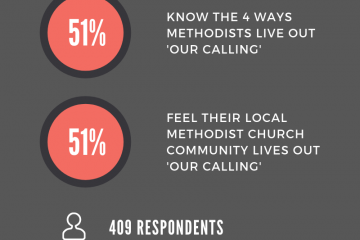Let’s disagree agreeably.
We live in a time where division seems to be common place. One man’s Brexit means Brexit, whilst another’s means “we didn’t properly know what we were voting for”. For one person Jeremy Corbyn is pro-Palestine, to another he’s an anti-Semite. For some, Boris Johnson says what everyone thinks, whilst for others he delivers appalling discriminatory statements. Trump is making America great again, or building walls and serving his super-rich friends. And in our church… Gay marriage might either go against the divine authority of the bible, or see an inclusive, loving Gospel more fully realised. Of course, there is the grey area between each of those positions. It feels though that with each division, positions are becoming ever more polarised.
The Methodist Church has a wonderful and proud history of pro-actively seeking justice. A history that is alive and well today. More and more Methodists are engaging in issues of justice, whether it be locally or nationally, and what a great place for today’s church to reside. However, are we at risk of making the situation worse? Not by what we believe, debate and campaign for, but by how we communicate in our search for justice.
Issues like Brexit elicit strong responses on both sides of the argument. As the stakes become higher, the arguments become stronger, and the language used becomes more passionate, robust, and sometimes down-right angry. At the same time, the positions held by both sides of the argument seems to be hardening, or even becoming more extreme versions of themselves. It seems the conversations, debates and campaigning aren’t bringing people together, but conversely, are pushing people further apart.
As a church, how do we respond? How do we represent Christ as we seek justice in these divisive issues? As Conference explores the Marriage and Relationship report, and over the next year, local churches discuss the issues raised, how do we honour God, the bible, and seek God’s will? How do we find a common place?
We must vocally stand up for what is right, what is good, and what is holy. But we must do this with a tone, manner and respect which is distinct from the debate held in the rest of our culture. Or else, where is Christ in what we say?
In a Methodist social media forum, I recently let another member know that I was finding the tone of their argument disagreeable. It was wonderfully ironic that my comments about how we speak to each other were met, by more than one person, with either accusations that I’d tell Christ what he says is disagreeable, or with sarcastic and mocking comments, or being told that I’m just a newcomer, or somebody with ‘different’ ethics and theology – presumably not Methodist enough for that Methodist forum. It seems my point was somewhat missed.
The main argument against my request for a gentler debate was that Christ used some pretty fruity language towards the Pharisees and Sadducees, that he turned tables over in the temple, and was generally direct when faced with an injustice, or wrongdoing. All true, but that’s not the whole story of the gospels. What about the comforting Christ, the compassionate Christ, the grace giving Christ?
John Wesley wrote a sermon, centuries ago, which is particularly pertinent in the present social media age. A sermon which might lend insight on how we should speak, particularly to our brothers and sisters in Christ, who we might view as wrong, or sinful. Guidance perhaps on how we should speak of equality to those who use racist, homophobic or discriminatory language. Guidance on how we speak to those who support parties, politicians, or opinions which are different to our own.
Wesley explores Matthew 18:15-17: “15If your brother or sister sins, go and point out their fault, just between the two of you…” When you do so, says Wesley, you should not do so proudly, as if you are better than the other person. You should avoid any hint of hatred or ill will. When we are impassioned to see injustice overturned, this may be tricky. But Wesley warns, that in our “noble… holy indignation against these vile creatures, we commit sin from mere hatred of sin! We serve the devil out of pure zeal for God!” Rather, your words should be gentle in the hope of winning the other person over.
Wesley’s final point in his wonderfully titled sermon, “The cure of Evil-speaking”, is that if, even after all persuasion the sinner – or we may apply the sentiment to a person who holds an alternative view – does not change their mind, and come around to your argument that: “Indeed you still owe to him…earnest, tender goodwill. You owe him courtesy, as an occasion offers all the offices of humanity.”
In this time of division, change and challenge, I love Wesley’s idea of letting our words be gentle in the hope of winning over the other person. What a difference the Methodist Church could make in the issues facing our communities and country today, if each of us not only take a lead on these issues, but lead on how debate and discussion should be held. Maybe, just maybe, we might then unite, and not divide.


0 Comments